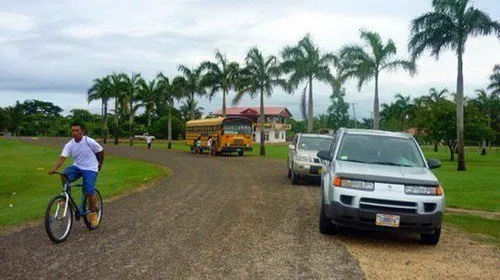Curious if it’s possible to teach flimmaking abroad?
Welcome Cybel Martin to discuss!
TeachingTraveling.com: Thanks so much for chatting with us, Cybel! Tell us about your background.
Cybel: I’m a native New Yorker and work as a Cinematographer for commercials, documentaries and feature films. I went to a very good high school, Trinity School, that encouraged volunteering.
Ever since high school, I have had a fondness for volunteering for organizations that support children and the arts. In recent years, that passion has translated into my teaching filmmaking in both the US and abroad.
I’ve been fortunate to travel domestically and internationally constantly since before I could talk. Living in New York exposes me to such diverse and amazing cultures. There is not one country I am not curious about.
TT: What was a recent film travel voyage you took?
C: This past July, I taught a workshop in Belize titled “The Art and Craft of Documentary Storytelling”. The workshop was in conjunction with the Belize International Film Festival. It was an intensive workshop of film theory and hands-on HD camera experience.
It’s enjoyable to teach documentary filmmaking abroad and listen to my students pitch their story ideas. This group of students were working on film subjects that included Mayan Medicine, locals working at the US Embassy and life cycle of a Mangrove tree. Their ideas were specific to Belize and yet, still grappled with very universal issues of equality and vanishing natural resources.
What astonished me the most was reconnecting with students from the previous year who quoted my lectures and more importantly, had films in the film festival.
TT: How did you find this opportunity doing film in Belize?
C: This trip was my third trip to Belize. My first visit was in 2008 in my capacity as a Cinematographer. I was shooting a documentary called “Punta Soul” directed by Nyasha Laing. Nyasha also started an artist collective called Global Parish. It was Global Parish’s initiative and efforts that made it possible for me to teach twice in Belize.
I’ve developed some wonderful friendships in Belize. I even have my favorite restaurants. A wonderful byproduct of teaching abroad is exploring the country on your free time. Belize is absolutely beautiful. I have been able to see rain forests, Mayan ruins and swim with Stingrays. My goal is to complete my scuba certification before my next visit.
TT: How did you find your other film teaching traveling opportunities?
C: A fascination in filmmaking is universal. I didn’t really “get that” until I started teaching film abroad. All of my teaching opportunities started either by shooting a film abroad and being invited back or by an International film festival that wanted to include a teaching component to give back to the local community. Otherwise film festivals typically cater to the film VIPs who are attending.
TT: How did you pay for your teaching travel?
C: In every instance, a not for profit organization in the hosting country paid for my travel, lodging and supplies. I’ve taught Cinematography and Advanced Lighting workshops in Nigeria (which has the world’s third largest film industry!) on two occasions. The African Film Academy, which is a part of the African Movie Academy Awards, took care of the logistics so I could teach in both Yenagoa and Lagos, Nigeria.
TT: How has teaching and traveling shaped your career?
C: I believe film can be an instrument for social change. Extending myself in diverse cultures keeps me sensitive to the life experiences outside the comforts of New York City and Hollywood. .
Traveling and teaching abroad has the added bonus of my being treated and appreciated as a leader in my industry. The vast majority of people who work as Cinematographers in the US are white and male. I read that of all the feature films shot last year in the US, only 1% were shot by a female DP (Director of Photography). Teaching has opened up opportunities for me to connect with International filmmakers and shoot many more jobs abroad. I’ve been fortunate to collaborate with directors and producers from Nigeria, Mexico, India and Belize.
After my last trip to Nigeria, I published a book of photographs documenting our trip. The book is called “Picture in Nigeria” (check it out at this link!).
Besides being the third largest film industry, Nigeria also had some of the best live music that I’ve ever enjoyed. There are pictures of my students, my fellow teachers plus moments at La Cachette restaurant and Legato nightclub. Those images of Nigeria are almost never seen in the media.
It was also because of my experiences in Nigeria that I had my first write-up in, arguably, the most prestigious magazine for my craft, American Cinematographer Magazine.
TT: How has teaching and travel changed you as a person?
C: I believe traveling, connecting with diverse cultures, and witnessing their hardships makes me more compassionate and deepens my appreciation for the life I have. In every single country I’ve visited, I’ve made new friends, enjoyed an incredible meal and laughed hard and often.
It seems on every trip, I have one “Ugly American” moment. I’d like to think of myself as culturally sensitive but as much as I brush up on my visiting country, some ignorance on my part will rear its head. Thankfully it’s one event per trip. These moments (and my host’s reaction) keeps me humble. For example, asking if I could buy a protein bar or V8 while traveling through Zulu-Natale, South Africa. I still get teased for that one.
TT: What advice do you have for aspiring teacher-travelers?
C: My advice would be: expect to be frustrated, but do it anyway. Although you will arrive with a well thought out plan and syllabus, be prepared to throw it out the window and design a whole new curriculum the day you arrive. Also, teaching English is the most popular way to travel and teach abroad. However, if I can find numerous ways to teach filmmaking in other countries, certainly other skills and passions can be taught as well.
TT: Thanks so much, Cybel. What a refreshing, fascinating interview… and man do I ever want to paddle around now in that crystal-silver water in the second photo! (Update: In 2012 I did a Belize honeymoon, in part because of this article’s inspiration!)

The author, Lillie Marshall, is a 6-foot-tall National Board Certified Teacher of English from Boston who has been a public school educator since 2003. She launched TeachingTraveling.com in 2010 to share expert global education resources, and over 1.6 million readers have visited over the past decade. Lillie also runs AroundTheWorld L.com Travel and Life Blog, and DrawingsOf.com for educational art. Do stay in touch via subscribing to her monthly newsletter, and following @WorldLillie on social media!





Rebecca Kuntz
Thursday 17th of March 2011
Love the article! I myself am a high school senior pursuing documentary film making. Heading to Ghana this summer for three months to teach English and make a doc! Thanks for the great advice!
Danae
Thursday 17th of March 2011
I love this particular interview since I am a film student myself. It's good to know that there are possibilities to teach subjects other than English abroad!
Lillie of TeachingTraveling.com
Thursday 17th of March 2011
I totally agree, Danae! It's so refreshing to get a possibility for travel beyond ESL. There are many, many ways to rock out this great world, and contribute while learning.
Bob
Saturday 23rd of October 2010
Delightful article and interview.Go Cybel